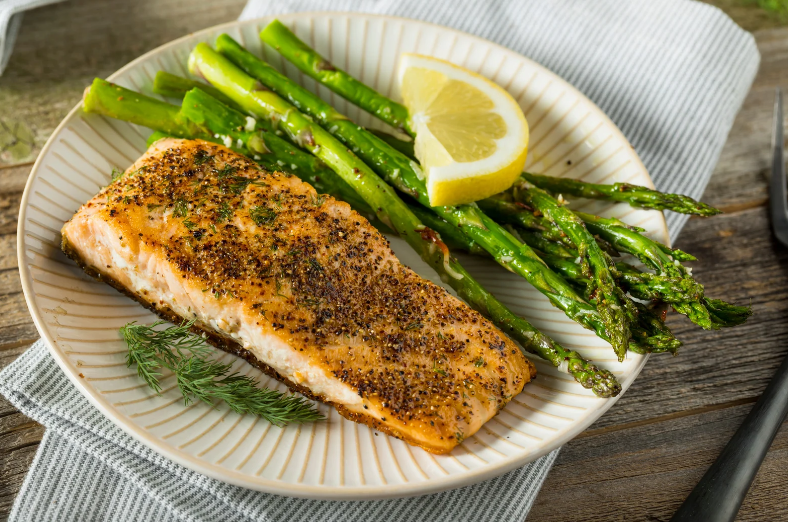
In a world of frozen dinners and takeout, the road to healthy eating can be rocky. Yet, nothing feels better than finding your way onto the precious path. But what happens your partner is on a different route? When they're all about potato chips while you head for the kale chips? Needless to say, it can pave the way for conflict.
First, it's natural to be concerned. Not only do you want the best for them, but their health—and lifespan—directly affect how much time you get to spend together. Their lifestyle choices may impact the eating habits of kids and grandkids, too.
Even your own habits can take a hit. "The simplest way couples influence each other is [by] proximity," observes Sally Chung, Psy
She adds that when your kitchen is stocked with chips and ice cream,
In fact, the British Journal of Health Psychology states that couples are likely to share health-related behaviors like eating and exercise. The overlap is so significant that a 2010 study in Public Health Nutrition found that couple-based weight loss programs are more effective than individual ones. Clearly, relationships are powerful.
This is where you come in. As your partner's other half, you're in a unique place to pave the way
Why Does Your Approach Matter?
In psychology, experts use the Interdependence Theory to explain how relationships influence a person's
Remember, change is not easy. According to Dr.
A gentle, loving approach sure beats negative tactics like guilt-tripping, policing and scolding. Unsurprisingly, these controlling methods are less likely to change your partner's behaviors, says the British Journal of Health Psychology. Even worse, these tactics
6 Ways to Encourage Your Partner to Eat Better
To start, avoid looking at this as a "project." Instead, view it as a journey that you are taking together. Shift your focus away from control and on to love, respect and support, starting with these six expert-approved tips.
1. Express Concern
It might seem like an obvious first step, but your partner can't read your mind. Make it known that you value health, and you'd love for them to come along for the ride. Kindly remind them that you have a future together.
Share that you are willing to work as a team—not take over their decision-making and schedule. "Ask what you can do to be supportive," suggests Dr.
2. Lead by Example
Practice what you preach. Actions speak louder than words, as they say.
Instead of reprimanding your partner's actions, use that energy to show how you benefit from healthy habits. Focus on the perks, whether you are saving cash by prepping breakfast before work or feeling satisfied after eating a meal rich in whole grains and bright veggies.
Not only will this help you become a positive eating companion for your partner, but you will also create a healthy social eating environment, a factor that affects obesity risk.
3. Do It Together
From meal planning to making brunch, aim to be by your partner's side. "Embrace healthy eating together," recommends Lisa R. Young, Ph.D., R.D., a nutritionist, author of "The Portion Teller Plan" and adjunct professor of nutrition at New York University. "Make it fun! Make it a team effort."
Prioritize eating, cooking and grocery shopping together. Not only will this communal tactic
For example, instead of sneaking peas into their burgers, show how easy it is to make delicious veggie patties at home. Spend a lazy Sunday
4. Praise Positive Habits
"A great way [to show support] is pointing out the positive choices and changes," Dr.
If your partner made a rare effort to eat breakfast, mention how energized they will feel for that morning meeting. Nothing beats a simple "I'm proud of you", too.
Take it up a notch and note how their changes positively impact you. Did you just cook a tasty dinner together? Dr.
She also adds that some may feel like others don't notice until a mistake is made. So, instead of scrutinizing how your partner is on a first-name basis with the pizza guy, acknowledge positive choices both big and small. It's a caring way to feed the very habits you want to encourage.
5. Highlight What They Care About
While offering praise and ideas, find opportunities to demonstrate how healthy eating can enhance their quality of life. Emphasize habits that can change what matters to them, whatever that may be.
Are they battling sluggishness, poor digestion or heartburn? Kindly suggest a positive eating habit that can alleviate their struggles. It's a gentle nudge that offers a nutritional advantage. Something like, "Hey, bananas are an awesome source of energy. Want to freeze some and make 'ice cream'?" could open their eyes to an option they hadn't ever considered.
Don't forget that positivity is the name of the game. Sure, they may "care" about their love handles, but this isn't a chance to dig into those insecurities.
"This can backfire. Being critical or shaming only leads to more distance," warns Dr.
6. Be Realistic
When it comes to changing our habits, we're always told to set small goals. Dr. Young reminds us that making small changes will also limit or prevent major setbacks. So why should your partner's experience be any different?
They won't eat five serving of veggies overnight, and you shouldn't expect them to. While it can be a challenge if you've been on the journey to health for a few months or more, it's important to remember what it felt like to be a beginner and acknowledge that healthy habits develop slowly over time.
As your partner's biggest cheerleader, your role is priceless. Yet, ultimately, it's up to them to make a change. This is tricky enough when one is watching! Regularly check in with yourself to make sure you're not taking control. Exercise compassion, and create a safe space where your partner can tackle a giant mountain. They are only human, but with your love and support, they can climb it.













